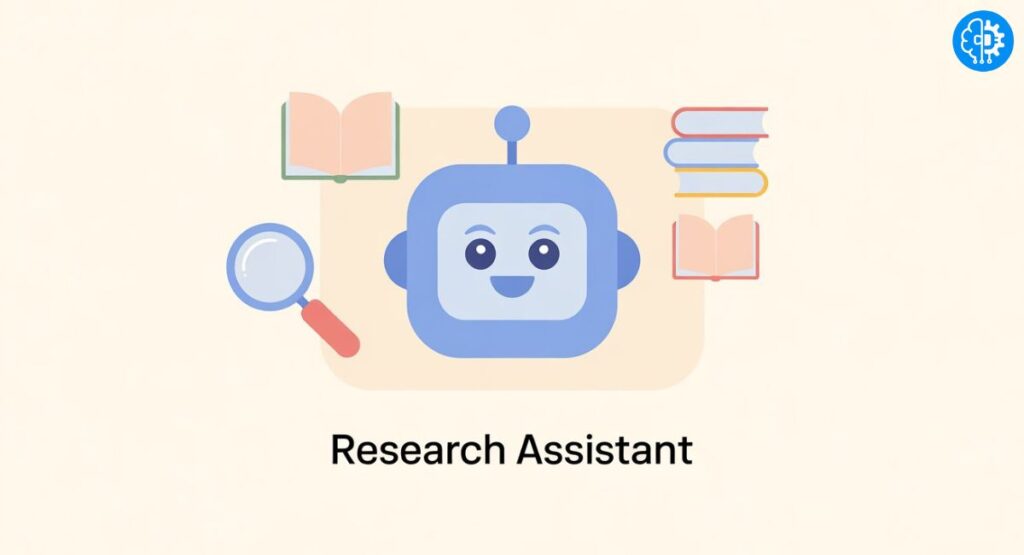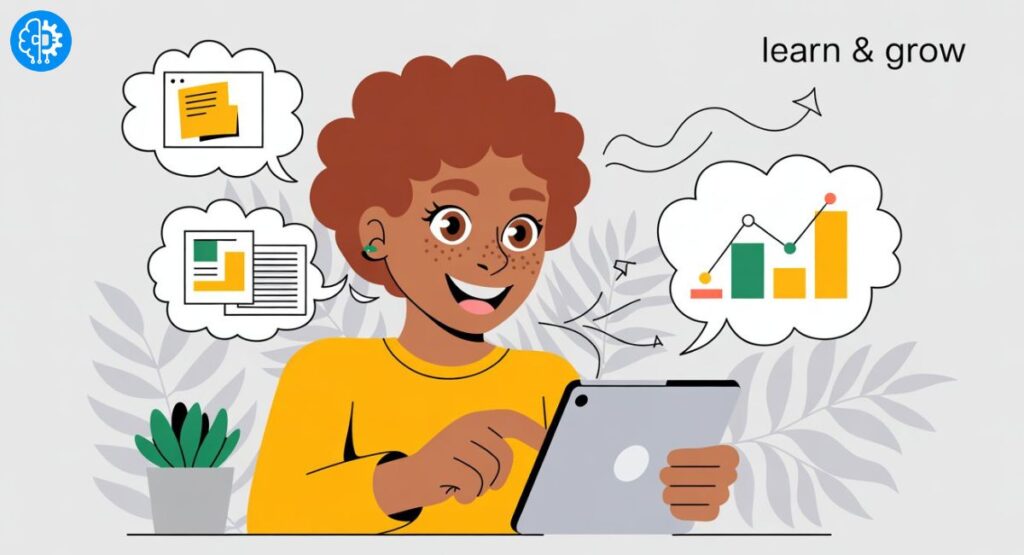Introduction
The way students approach academic research is changing fast. Thanks to ChatGPT prompts for research, what once took hours of flipping through textbooks and journal articles can now be done in minutes. With tight deadlines, endless reading lists, and constant pressure to produce quality work, students need smarter tools to stay ahead. Using AI tools for research not only sparks fresh ideas but also helps break down complex topics, making academic writing less stressful and more effective for both learning and professional growth.

The rise of AI in education
AI isn’t just a trend; it’s becoming part of everyday learning. From automated grading systems to AI-driven tutoring, tools like ChatGPT make research and study design more efficient. Universities now encourage students to use AI responsibly for literature synthesis, research gap analysis, and even thesis writing.
Benefits for productivity and learning
Used well, ChatGPT helps students focus on critical thinking rather than busywork. It can summarize lecture notes, draft outlines, and even suggest research questions. Many students say it feels like having a study partner who’s available 24/7. Whether you’re preparing a symposium presentation or refining your dissertation writing, AI-assisted research saves time and reduces stress.

Limitations and ethical considerations
AI tools aren’t perfect. They can miss context, misinterpret data, or present outdated information. Relying blindly on AI-generated content risks plagiarism or inaccuracies. Ethical guidelines in research are crucial here. Students must verify every claim, cite credible sources, and treat ChatGPT as a support tool rather than a replacement for critical thought.
ChatGPT Prompts for Choosing a Research Topic & Title

Brainstorming and narrowing down ideas
Choosing a topic is often the hardest step in academic research. ChatGPT prompts can spark creativity by generating lists of themes across fields like public health research, renewable energy research, or business strategy research. For example, you might ask:
“Suggest 10 unique research questions in social media analysis for education.”
From there, refine your focus using mixed-methods research or field study design prompts to narrow the scope.
Title refinement and keyword-rich titles
A strong research title improves visibility and clarity. ChatGPT can help craft keyword-rich titles optimized for open-access publishing. For instance:
“Rewrite this title with clear keywords for better academic publication reach.”
This is particularly helpful for thesis writing, grant applications, or academic publications where precision matters.
Gap identification in existing studies
Prompts like:
“Summarize gaps in renewable energy research literature.”
help students locate underexplored areas, giving their work originality. AI tools can highlight trends, reveal outdated data, and inspire theoretical frameworks for your project justification.
Prompts for Writing Academic Paper Sections
Introductions and thesis statements
Crafting a strong introduction sets the tone for your paper. ChatGPT can draft engaging opening paragraphs and thesis statements that outline your study design, research variables, and goals clearly.
Literature reviews and source summaries
Instead of manually summarizing dozens of papers, use AI to create concise literature review sections:
“Summarize findings from five peer-reviewed articles on dietary studies.”
Then, rewrite and synthesize literature manually to ensure accuracy.
Methodology, results, and discussion guidance
Prompts like:
“Provide a step-by-step research methodology guide for qualitative coding in healthcare research.”
Help structure methodology sections. AI can also assist in interpreting quantitative data or suggesting discussion sections, but human insight must lead the final interpretation.
Prompts for Essays, Reports, and Assignments
Argumentative and expository essays
Students can use prompts to strengthen essay writing:
“Draft a balanced argument for workplace policy advocacy in education.”
AI-generated outlines ensure essays are clear and evidence-based.
Lab reports and case studies
For technical writing, ChatGPT can generate structured lab reports, clinical case studies, or patient experience analysis summaries, saving hours of formatting time.
Business, law, and technical assignments
In fields like law or engineering, prompts can clarify complex concepts. Example:
“Explain contract law principles in simple terms for an undergraduate report.”
Want to make the most of AI? Learn How to Use ChatGPT Effectively.
Study & Productivity Prompts
Summarizing textbooks and lecture notes
Prompt example:
“Summarize this 50-page cognitive assessment chapter in simple bullet points.”
This makes heavy reading manageable and ensures nothing important is missed.
Creating study guides and flashcards
ChatGPT can turn textbooks into practical tools:
“Create 20 flashcards based on this chapter on public health research.”
Time management and exam preparation
Prompts can even plan study schedules:
“Create a two-week exam preparation plan for mixed-methods research.”
Explore AI basics in our latest article.
Presentation & Communication Prompts
Creating slides and outlines
Students can quickly generate structured slides:
“Make a slide outline for a symposium presentation on wildlife conservation research.”
Speech and debate preparation
AI helps draft speeches or debate scripts:
“Write a persuasive speech for a policy advocacy event in education.”
Simplifying complex ideas for presentations
ChatGPT excels at simplifying complex data for non-specialist audiences, improving your research presentation skills.
Academic Integrity & Responsible Use
Avoiding plagiarism with AI tools
AI content is not plagiarism-free by default. Always rewrite, paraphrase, and format references and citations correctly. Tools like Grammarly or Quillbot can help polish text, but should never replace original thought.
Checking AI output with fact-verification
Prompt example:
“Fact-check this paragraph with peer-reviewed references.”
This keeps your academic research credible.
Tools for detecting and polishing AI content
Use Turnitin or Copyscape for originality checks. Then refine the text manually to maintain a natural flow.
Advanced Use Cases for Graduate & PhD Students
Thesis/dissertation support prompts
Prompts like:
“Help structure a dissertation on social media analysis in education.”
can guide thesis writing, but always back results with peer-reviewed studies.
Research frameworks and hypothesis testing
AI can suggest theoretical frameworks or draft hypotheses:
“Propose hypotheses for qualitative analysis of renewable energy adoption.”
Collaboration and co-authoring with AI
Grad students can use AI for brainstorming and collaboration, but must maintain ethical practices in research to ensure originality.
Practical Tips to Maximize ChatGPT’s Potential
How to refine prompts for better results
Be specific. Instead of “Write about AI research,” say, “List three experimental research methods for healthcare studies.” Specific prompts yield accurate, actionable content.
Combining ChatGPT with reference managers (Zotero, Mendeley)
Integrate AI summaries with Zotero or Mendeley to store and organize citations efficiently.
Using ChatGPT with citation and formatting tools
Prompt example:
“Format these references in APA style for a literature synthesis paper.”
Conclusion
ChatGPT is much more than just a writing tool. It’s a productivity booster and a true research partner. With it, students can save hours on brainstorming, literature synthesis, and data interpretation, freeing up time to focus on deeper analysis. By combining strong prompts, thorough fact-checking, and personal insight, you can produce work that feels both academically rigorous and truly original. The future of academic research will favor those who use AI wisely, striking a balance between speed and critical thinking.

FAQs
What are ChatGPT prompts for research?
ChatGPT prompts for research are clear instructions you give to ChatGPT to get focused, relevant answers. They help you gather information quickly and organize your thoughts more effectively.
How can AI research prompts help students?
Using AI research prompts saves time by summarizing articles, generating study ideas, and recommending useful resources. This makes research and assignments less stressful.
Are ChatGPT research tips always accurate?
While ChatGPT research tips are helpful, you should always double-check facts. AI is a great guide, but reviewing credible sources keeps your work trustworthy.
Can I use AI tools for research and writing?
Yes! AI tools for research can help with outlines, drafting, and improving clarity in your writing. Just remember to add your personal style and critical thinking.
Why is learning to write better ChatGPT prompts important?
Strong ChatGPT prompts lead to better answers, saving time and effort. Knowing how to guide AI effectively makes your research process smoother and smarter.
